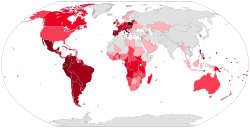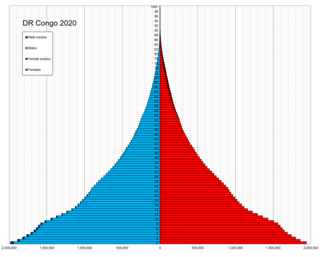
Demographic features of the population of the Democratic Republic of the Congo include ethnicity, education level, health, economic status, religious affiliations and other aspects of the population.

Pointe-Noire is the second largest city in the Republic of the Congo, following the capital of Brazzaville, and an autonomous department since 2004. Before this date it was the capital of the Kouilou region. It is situated on a headland between Pointe-Noire Bay and the Atlantic Ocean. Pointe-Noire is the main commercial centre of the country and has a population of 715,334 (2007), expanding to well over 1 million when the entire metropolitan area is taken into account.

The Catholic Church is "the Catholic Communion of Churches, both Roman and Eastern, or Oriental, that are in full communion with the Bishop of Rome ." The church is also known by members as the People of God, the Body of Christ, the "Temple of the Holy Spirit", among other names. According to Vatican II's Gaudium et spes, the "church has but one sole purpose–that the kingdom of God may come and the salvation of the human race may be accomplished."
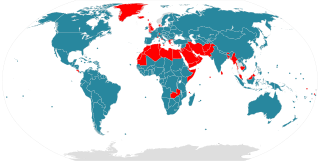
A secular state is an idea pertaining to secularity, whereby a state is or purports to be officially neutral in matters of religion, supporting neither religion nor irreligion. A secular state claims to treat all its citizens equally regardless of religion, and claims to avoid preferential treatment for a citizen based on their religious beliefs, affiliation or lack of either over those with other profiles.

Berbérati is the second-largest city in the Central African Republic, with a population of 105,155. Located in the south-west of the country, near the border with Cameroon, it serves as capital of the Mambéré-Kadéï Prefecture and the Berbérati sub-prefecture.
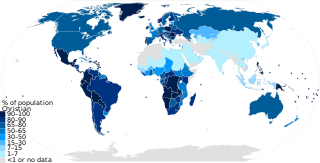
As of the year 2023, Christianity had approximately 2.6 billion adherents and is the largest-religion by population respectively. According to a PEW estimation in 2020, Christians made up to 2.6 billion of the worldwide population of about 8 billion people. It represents nearly one-third of the world's population and is the largest religion in the world, with the three largest groups of Christians being the Catholic Church, Protestantism, and the Eastern Orthodox Church. The largest Christian denomination is the Catholic Church, with 1.3 billion baptized members. The second largest Christian branch is either Protestantism, or the Eastern Orthodox Church.

The Catholic Church in Angola is part of the worldwide Catholic Church, under the spiritual leadership of the Pope in Rome.

The Catholic Church in Yemen is part of the worldwide Catholic Church, under the spiritual leadership of the Pope in Rome.

Catholicism has a major presence in the Democratic Republic of the Congo (DRC). It is part of the worldwide Catholic Church under the spiritual leadership of the Pope in Rome.

Christianity is the most widely professed religion in the Dominican Republic. Historically, Catholicism dominated the religious practices of the country, and as the official religion of the state it receives financial support from the government. Currently about 60% of Dominicans identify as Catholic.
According to various polls, the majority of Kazakhstan's citizens, primarily ethnic Kazakhs, identify as Sunni Muslims, Less than 1% are part of Shi'a. There are a total of 2,900 mosques, all of them affiliated with the "Spiritual Association of Muslims of Kazakhstan", headed by a supreme mufti. The Eid al-Adha is recognized as a national holiday.

Christianity is the predominant religion in the Democratic Republic of the Congo. As of 2018, the US State Department reported that roughly 96% of the population are members of Christian denominations, with the remaining less than 5% following other non-Christian religions. According to the 2020 Report on International Religious Freedom, an estimated 48.1% of the population are Protestant, including evangelical Christians and the Church of Jesus Christ on Earth through the Prophet Simon Kimbangu (Kimbanguist), and 47.3% Catholic. Other Christian groups include Jehovah’s Witnesses, The Church of Jesus Christ of Latter-day Saints, and the Greek Orthodox Church.
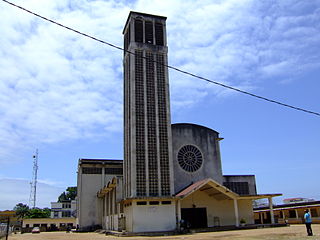
Christianity is the predominant religion in the Republic of the Congo, with Catholicism being its largest denomination.

Louisiana is a South Central U.S. state, with a 2020 U.S. census resident population of 4,657,757, and apportioned population of 4,661,468. Much of the state's population is concentrated in southern Louisiana in the Greater New Orleans, Florida Parishes, and Acadiana regions, with the remainder in North and Central Louisiana's major metropolitan areas. The center of population of Louisiana is located in Pointe Coupee Parish, in the city of New Roads.
Of the religions in Tunisia, Islam is the most prevalent. It is estimated that approximately 99% of Tunisia's inhabitants identify themselves as Muslims.

Religion in Slovakia is predominantly Christianity, adhered to by about 68.8% of the population in 2021, a decrease from 75.5% in 2011 and 83.8% in 2001.
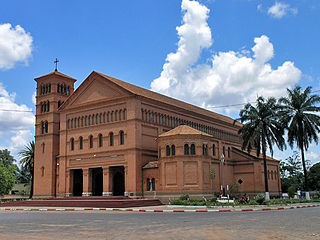
Christianity is the majority religion of the Democratic Republic of the Congo and is professed by a majority of the population.
Based on the numbers of adherents, the Eastern Orthodox Church is the second largest Christian communion in the world, after the Roman Catholic Church, with the most common estimates of baptised members being approximately 220 million. The numerous Protestant groups in the world, if taken all together, substantially outnumber the Eastern Orthodox, but they differ theologically and do not form a single communion.
